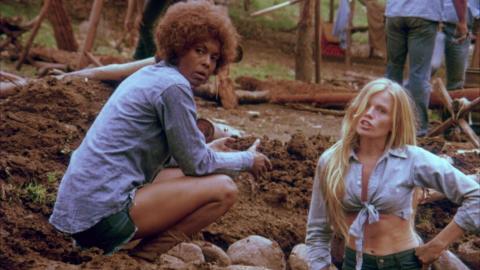The Equal Opportunity Exploitation of Stephanie Rothman: TERMINAL ISLAND

TERMINAL ISLAND
These notes on Stephanie Rothman's Terminal Island were written by Maureen Rogers, PhD candidate in UW Madison’s Department of Communication Arts. A DCP of Terminal Island will be the first of two Rothman movies to screen at the Cinematheque on Saturday, October 21 at 7 p.m., in our regular venue, 4070 Vilas Hall. Rothman's The Student Nurses will screen on Saturday, October 28. Admission is free for both screenings.
By Maureen Rogers
The pantheon of exploitation auteurs includes some familiar names—Russ Meyer, Roger Corman, Joe Dante, and Jack Hill—while the directors who got their start in the Corman school are some of the most acclaimed American filmmakers of New Hollywood—Jonathan Demme, Francis Ford Coppola, and Martin Scorsese. It is not controversial to say that the work of Stephanie Rothman, a student of the Corman method and colleague to the movie brats, has been entirely elided from histories of 1970s Hollywood and from fan and academic considerations of exploitation cinema. “The Equal Opportunity Exploitation of Stephanie Rothman,” Cinematheque’s 2-film series, shows Rothman as an able exploiteer and innovator; her exploitation cinema could titillate and entertain, and also present female characters with complexity and agency, something her peers rarely attempted.
The first woman awarded the Directors Guild of America fellowship at USC, Rothman directed seven films, earning screenplay or story writing credits for each film. Working within the most prominent independent studios at the time, Rothman made Blood Bath (1966) and It’s a Bikini World (1967), at American International Pictures. The Student Nurses (1970) and The Velvet Vampire (1971) were produced and released by Corman’s New World Pictures. Citing dismal pay at New World, Rothman and co-collaborator Charles Swartz moved to Dimension Pictures, a commercial exploitation firm founded by Corman colleague and former drive-in exhibitor Larry Woolner. There, Rothman directed 1973’s Terminal Island and Group Marriage (1973).
Terminal Island was released in the twilight of drive-in exploitation cinema, just prior to the blockbuster film’s economic dominance over the southeastern drive-ins and second-run theaters that were the foundation of the exploitation market. Strategic in its appeal to the low-budget drive-in market, 1973’s Terminal Island combined several of the most prominent exploitation film trends (the women-in-prison picture, sexploitation, and blaxploitation).
Some have noted, however, that Rothman’s films transcended the predictable narrative formulae of exploitation cinema (which Dante has neatly summarized as “sex, death, and car crashes.”) Working within exploitation’s protocols of sexual objectification and racial caricature, Rothman injected elements of social progressiveness, however superficially—often in the ‘empowered babe’ female characters type depicted in her films.
On Terminal Island specifically, Rothman said she and Swartz were handed the project and therefore locked-in to making a conventional, women-in-prison action film released in the drive-ins during the summer season, then the dumping grounds for genre fare. In a 2016 Interview feature by Colleen Kelsey, Rothman said:
“Now, of course, in a film like Terminal Island [1973], practically the whole film involves violence because the subject matter is violent people. I accepted that…. What I needed to do was try to refine that and give it some meaning beyond the violence itself, or beyond the nudity itself. In that sense, I tried very hard to not make it exploitative.”
In a review of the film, Boxoffice observed that Rothman “handles rugged material well,” noting that “the women [in the film] are used as sexual objects and beasts of burden, yet there is little sex and just a fair amount of nudity. They become every bit as resourceful and tough as the men.”
Such modest acclaim from trade press failed to open doors for Rothman in Hollywood. Indeed, Rothman has talked openly about her disappointment in being relegated to exploitation filmmaking for her entire directorial career. Discussing her efforts to give voice to creative expression within this formulaic mode of filmmaking, Rothman explained to Interview:
“…I was making low-budget films that were transgressive in that they showed more extreme things than what would be shown in a studio film, and whose success depended on their advertising, because they had no stars in them. It was dismaying to me, but at the same time I decided to make the best exploitation films I could. If that was going to be my lot, then that’s what I was going to try and do with it.”
